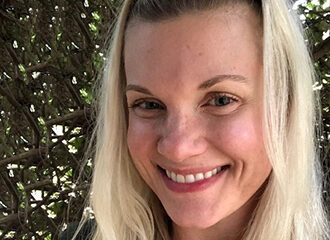 Written by: Erin Birely, LCPC
Written by: Erin Birely, LCPC
Alumni Services Coordinator, The Renfrew Center
& Team Leader, The Renfrew Center of Baltimore
Excessive social media use can have a negative impact on mental health concerns – especially eating disorders. In this post, we look at how to find balance for yourself and others.
Social media has grown significantly in the past 10-15 years. Initially used to connect college students, it has grown to a countless number of platforms with billions of users. With the expansion in how social media is used, we have also seen a change in the way it is used. When the social world first launched, photos were taken on cameras before being uploaded to a computer. Now, we can take pictures instantly and share them with everyone we are connected with via a few simple clicks on our phones. With the ease and increase in media being shared, we’ve also seen a surge in filters and inauthenticity.
Studies have shown that social media use can lead to an increase in mental health concerns like depression, anxiety and eating disorders. While the causes can range from experiences with cyberbullying to feelings of being left out or missing out, we also know it can come from having unrealistic expectations set for ourselves from the constant viewing of edited photos of people claiming, “No Filter.”
With that in mind, here are some of our tips for promoting balance for yourself and for others.
5 Tips for Finding Balance on Social Media
1. Check Your Own Posts
Many of us fall into the trap of feeling like we can only post the “perfect” things in life—the new job we have, the exciting opportunity we took part in or the picture that took multiple takes to get “just right.” This tricks us into believing those other parts of our lives aren’t enough and can even influence our belief as to whether we are enough.
Challenge yourself to expand what you are willing to post and think about your intention behind it. That picture you took with friends likely wasn’t for a modeling portfolio, but was instead meant to capture a moment of fun and enjoyment. Let the pictures you post show that, not that you know the “right” angles and filters to use.
2. Fill Your Feed With Variety
Take a moment to review who you are following and what they are filling up your feed with. Are these accounts showing both the curated and the messy parts of life? Do they talk about struggles as well as the successes? If it doesn’t seem like there is a lot of balance, ask yourself why you are following them.
3. Notice Your Automatic Thoughts About Other’s Pictures
When we see a picture or post we all have immediate thoughts about it; we make meaning of the post or picture and how it fits, or doesn’t fit, into our world and reality. Often, these appraisals are automatic and few of us take time to think about any other possible ways the post could be interpreted.
Pause and think about what other ways you could make meaning of the post—are there details of the picture you are not seeing? Have you thought about what information isn’t included in that square or limited number of characters? Considering these other possibilities will help to boost our own cognitive flexibility and get us unstuck from a narrow view of what we are seeing.
4. Post a #Fail
Don’t be afraid to share the things that didn’t go quite as planned! Posting the times that were a struggle for us to get the way we wanted helps normalize this for ourselves and for others. Failure isn’t something we need to be afraid of, it’s often part of the process we all must go through to learn and grow. Go against that belief that tells you, “I can only show the success and I have to be perfect” and let yourself show the failure, it’ll make sharing the successes that much more meaningful and worthwhile.
5. Get Others in On Being Real
Encourage those you are close with to be real on their social media accounts. Start discussions about what is real versus filtered and see what others think about it. Kindly encourage the influencers you follow to show more of their real lives in addition to what they are posting. Engage with content that promotes authenticity and vulnerability.
#RenfrewRecharge
World Mental Health Day, an annual campaign hosted by the World Federation for Mental Health, celebrates awareness for the global community by empowering individuals to take action and create lasting change on the importance of mental health.
This year, The Renfrew Center is challenging YOU to take the #RenfrewRecharge pledge to recharge your mind and your body for at least one hour every day. It’s important to focus on your mental wellness, show gratitude for your body and all the amazing things it can do and reach out for help when you need it.
Share what you’re doing to care for your body and mind this week and beyond on social media using #RenfrewRecharge.
Conclusion
While these steps are not going to instantly change our relationship with ourselves or our social media accounts, they’re a start! The more we can see the realness of people’s lives the less we set ourselves up with unrealistic expectations and feelings of unworthiness.
Follow The Renfrew Center (@RenfrewCenter) on the following platforms for encouraging posts, event updates, programming announcements, and more.



